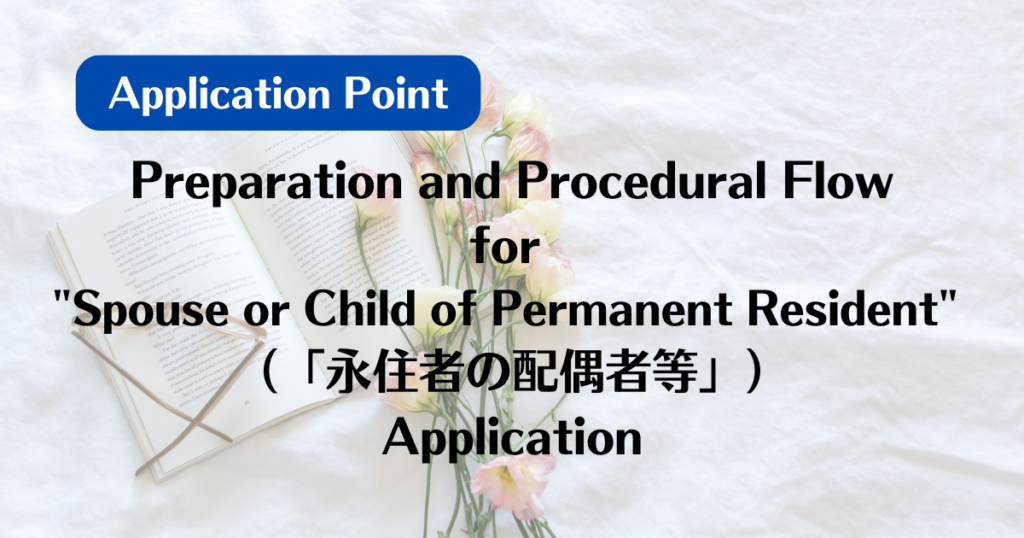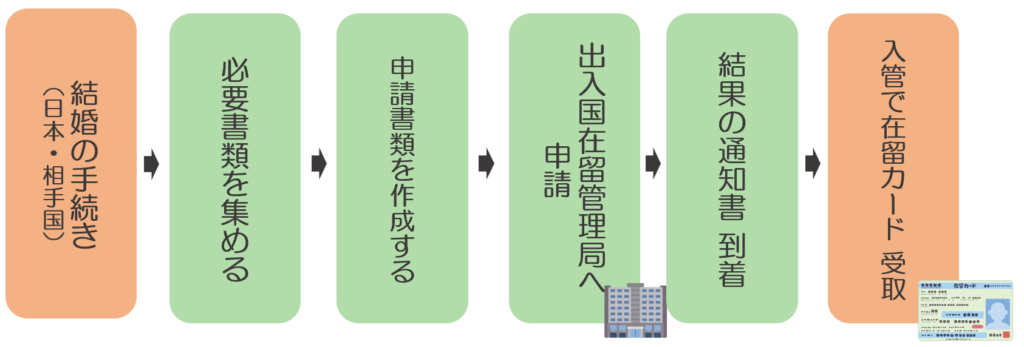
When married to a foreign national who resides in Japan as a “permanent resident,” the wife or husband can live in Japan by obtaining a status of residence (visa) as the “Spouse or Child of Permanent Resident”. Children of “permanent residents” born in Japan can also obtain this status. While this status of residence (visa) is very convenient because there are no restrictions on employment or activities, it is also characterized by strict screening.
In this part, we will explain the points of application and the flow of procedures for the “Spouse or Child of Permanent Resident” status of residence.
“Spouse or Child of Permanent Resident” status of residence

Those who are married to a person with a “permanent resident” resident card or children of foreign nationality born in Japan as children of a permanent resident may live in Japan by obtaining “Spouse or Child of Permanent Resident” status.
When a spouse (wife/husband) changes from a work visa to a permanent resident visa, the status of residence must be changed from “Dependent” to “Spouse or Child of Permanent Resident”. A status of residence is always required for a foreigner to stay in Japan. First, let’s check what a “Spouse or Child of Permanent Resident” is.
Who can apply for “Spouse or Child of Permanent Resident”?
Family members who can be invited to Japan under this status include not only the “spouse (wife/husband)” but also children of “permanent residents” who were born in Japan and continue to live in Japan. In summary, family members who can be called under the status of “Spouse or Child of Permanent Resident” are as follows.
・Children who were born in Japan as children of permanent residents and continue to reside in Japan: biological children and recognized children.
To further elaborate, if the foreign national making the application is a husband/wife, he/she must be a spouse (wife/husband) who is currently in a marital relationship. In other words, if you are engaged, in a common-law relationship, bereaved, or divorced, you are not eligible. In addition, if the foreigner is a child, the child must be a biological child born and residing in Japan, or a child who has been acknowledged (adopted children are not eligible).It is important to note that, for example, if a mother who has been in Japan for a certain period of time leaves the country with a re-entry permit and gives birth in her home country, the “Spouse or Child of Permanent Resident” status does not apply to her, and she must apply for “Long Term Resident” status. In addition, if a parent is a “permanent resident”, the applicant is basically required to apply as a “permanent resident”. If there is a delay in the procedure due to circumstances, etc., an application for “Spouse or Child of Permanent Resident” will be filed.
The marriage between husband and wife must be legally valid and the marriage must be real.
If you are staying with a “Dependent” and your spouse becomes a “Permanent Resident”, you must change your status.
For example, if a husband resides in Japan on a work visa (e.g., “Engineer/Specialist in Humanities/International Services”(「技術・人文知識・国際業務」) and his wife resides in Japan on a “Dependent” visa to live with her husband, when the husband becomes a “permanent resident”, the wife must change her status from “Dependent” to “Spouse or Child of Permanent Resident”.
The children of this couple must also change their status of residence from “Dependent” to “Long Term Resident” or other status.
On the other hand, if a couple is working together under “Engineer/Specialist in Humanities/International Services”, even if one of them becomes a “Permanent Resident”, it does not necessarily mean that the status must be changed to “Spouse or Child of Permanent Resident”.
If there is no change in your work in Japan and you will continue to engage in the same work, you may remain in Japan with the current status of “Engineer/Specialist in Humanities/International Services”. If permission to change your status of residence to “Spouse or Child of Permanent Resident” is granted, there will be no restrictions on your employment activities (type of work).
“Spouse or Child of Permanent Resident” can work freely in Japan
There are no restrictions on work activities (job types) for “Spouse or Child of Permanent Resident”. In other words, you are free to work part-time, work in an occupation that is not permitted with a work visa (e.g., line work at a factory under the category of “Engineer/Specialist in Humanities/International Services”), or start your own business. You can work as freely as Japanese nationals.
In addition, since the status of residence can be maintained as long as the marriage continues, you do not have to work.
Points for applying for “Spouse or Child of Permanent Resident” status of residence

The following points tend to be examined strictly for “Spouse or Child of Permanent Resident”
・The marriage must be legitimate.
・The couple must live together and mutually help and support each other.
The applicant must appeal these points in the documents attached to the application.
Point 1: Marital relationship must be true.
For “Spouse or Child of Permanent Resident,” the marriage must be true.
An “untrue marriage” is a marriage solely for the purpose of obtaining a visa. It may be a sham marriage that is not really a marriage, or a marriage that is practically divorced, but is continued for visa purposes only.
Compared to the working visa, the “Spouse or Child of Permanent Resident” is an “easy-to-use status of residence” because it has relaxed requirements for permanent residence or acquisition of Japanese nationality (naturalization), and there are no restrictions on employment. For this reason, it is easy to be abused, and the Immigration Service Agency is paying special attention to “sham marriages”.
For these reasons, when applying for “Spouse or Child of Permanent Resident,” you must write in detail the circumstances (How you met – How you started dating – How you got married )in a fixed format called a “Questionnaire,” (「質問書」) and appeal that it is a “true marriage”.
It may be embarrassing, but unless it is a sham marriage, you should be able to put a lot of information on the form, so fill in the details. In some cases, in addition to the contents of that “questionnaire,” you will also need to attach quite private details such as phone records, chats, and email correspondence.
In addition, the immigration office will use “cohabitation” as one of the key points of the marital relationship. Nowadays, there are many different ways to be a married couple, but newlyweds are less likely to get permission if they are not “living together” unless there are very good reasons to do so.
Point 2: You must be financially stable in Japan.
In the case of “Spouse or Child of Permanent Resident” status, there is no clear “annual income requirement”, but it is necessary to prove that you can lead a stable life in Japan. Basically, it is important to show that the two of you can live without incurring monthly deficits based on your income and assets. Income can be the foreigner’s own, the spouse’s (wife/husband), or both (total), as long as the income is expected to be sufficient to live on.
When applying for “Spouse or Child of Permanent Resident”, you will be required to submit a “taxation certificate”(「課税証明書」)or “tax payment certificate”(「納税証明書」)for resident tax. Please note that failure to pay taxes may result in the applicant being judged as having insufficient financial ability to pay his/her taxes.
Point 3) Documents must be well prepared.
The basic screening process for status of residence, not limited to “Spouse or Child of Permanent Resident”, is based on “documentary examination”. When you apply, there is no opportunity to explain at the counter. If your application is disapproved, you will be given the opportunity to get explanation about why your application was disapproved. However, if you explain your circumstances at that time, the disapproval will not become an approval. You must be able to submit the documents along with your application as a solid attachment at the time of application.
The list of required documents on the Immigration Service Agency’s website is the minimum required to accept an application. In some cases, you may need to gather and submit more documents than that, but first of all, it is important to gather all the necessary documents according to the list of required documents.
Understanding the Application Process

When applying for “Spouse or Child of Permanent Resident,” after confirming that you meet the requirements and have all the necessary documents, apply at the “Immigration Service Agency” that has jurisdiction over the area where you live.
Procedures for inviting family members from overseas – Application for Certificate of Eligibility ~在留資格認定証明書交付申請~
The procedure for inviting a family member (wife, husband) from abroad to Japan is called “Application for Certificate of Eligibility“. This procedure is performed at the Immigration Service Agency by the person calling the family member (Permanent Resident) on behalf of the family member.

Procedures for changing your status of residence from other status to Spouse or Child of Permanent Resident- Application for change of status of residence ~在留資格変更許可申請~
If you wish to change the status of residence of a family member (wife, husband) already living in Japan to “Spouse or Child of Permanent Resident”, an “Application for Change of Status of Residence” is required. This procedure is performed at the “Immigration Service Agency” that has jurisdiction over the area where the applicant (wife/husband of Permanent Resident) resides.

Required Documents
| In the case of a spouse (wife/husband) |
|---|
| ・Application form for Certificate of Eligibility / Application form for Change of Status of Residence ・ID Photo ・Spouse (permanent resident) and a marriage certificate(結婚証明書) issued by an institution in the applicant’s country of nationality (foreign country) ・Documents that prove the cost of staying in Japan ・Spouse (Permanent Resident) Letter of Guarantee(身元保証書) ・One resident card(住民票の写し) showing all members of the spouse’s (permanent resident’s) household ・Questionnaire ・Documents that can confirm exchanges between husband and wife |
*In addition to the above, documents that provide supplementary explanation of married life and documents showing past residence status may also be submitted. The above are minimum documents.
Application to the Immigration Service Agency
Basically, application is made at the Immigration Service Agency that has jurisdiction over the residence of the applicant or the applicant’s representative.
The following are the rules regarding where to apply.
The regional immigration office with jurisdiction over your planned place of residence , or the place of residence of the applicant’s representative.
【Application for change of status of residence or Application for extension of period of stay】
Regional immigration office with jurisdiction over the place of residence
| Regional Immigration Office | Area of jurisdiction of the |
|---|---|
| Sapporo Immigration and Residence Office | Hokkaido |
| Sendai Immigration Bureau | Miyagi, Fukushima, Yamagata, Iwate, Akita, Aomori |
| Tokyo Immigration Bureau | Tokyo, Kanagawa Prefecture (Yokohama Branch Office has jurisdiction), Saitama Prefecture, Chiba Prefecture, Ibaraki Prefecture, Tochigi Prefecture, Gunma, Yamanashi, Nagano, Niigata |
| Nagoya Immigration Bureau | Aichi, Mie, Shizuoka, Gifu, Fukui, Toyama, Ishikawa |
| Osaka Immigration Bureau | Osaka, Kyoto, Hyogo (Kobe Branch Office has jurisdiction), Nara, Shiga and Wakayama Prefectures |
| Hiroshima Immigration Bureau | Hiroshima, Yamaguchi, Okayama, Tottori, Shimane |
| Fukuoka Immigration Bureau | Fukuoka, Saga, Nagasaki, Oita, Kumamoto, Kagoshima, Miyazaki Prefectures, Okinawa Prefecture (Naha Branch Office has jurisdiction) |
If there is no branch office nearby, you may apply at the nearest branch or local office. However, depending on the branch office, there may be cases where they do not accept applications for status of residence, so please check with them.
▶ Immigration Services Agency: Jurisdiction
Who makes the application?
When inviting a foreigner from abroad, basically ,a Permanent Resident residing in Japan who invites the applicant (foreign national) or a relative of the Permanent Resident may apply on behalf of the applicant (foreign national). The applicant goes to the immigration office that has jurisdiction over the applicant’s planned place of residence or the place of residence of the applicant’s relative or other application agent. If the applicant is a child under 16 years of age, a legal representative (such as a parent) may apply on his/her behalf.
Also, a “Intermediary(取次者)” who has filed the application can apply on behalf of the applicant. Examples of “Intermediary” are administrative scriveners(行政書士) and lawyers(弁護士). You can also ask an administrative scrivener to do this for you.
After the permission is granted, please be careful here! ~About the period of stay
In many cases, when you receive a “Spouse or Child of Permanent Resident” residence card for the first time, the period of stay is “1 year” for the first time. This period of stay may be “1 year” or “3 years” even if the desired period of stay is “5 years”. This period of stay can be extended by applying for “Application for Extension of Period of Stay“.
Please be careful not to inadvertently let your period of stay expire.
Conclusion

The above is an explanation of the points and application process for “Spouse or Child of Permanent Resident”.
The “Spouse or Child of Permanent Resident” is not a visa that allows family members to come to Japan as a matter of course. Due to the increasing number of sham marriages, the examination process has become more and more severe in recent years. Please prepare well and be ready to live in Japan with your family as soon as possible.

【Advice from administrative scriveners】
If you are married to a “Permanent Resident,” you can continue your married life in Japan by changing your status of residence to “Spouse or Child of Permanent Resident” visa.
Our office can assist you with the procedures, so please contact us for more information.


